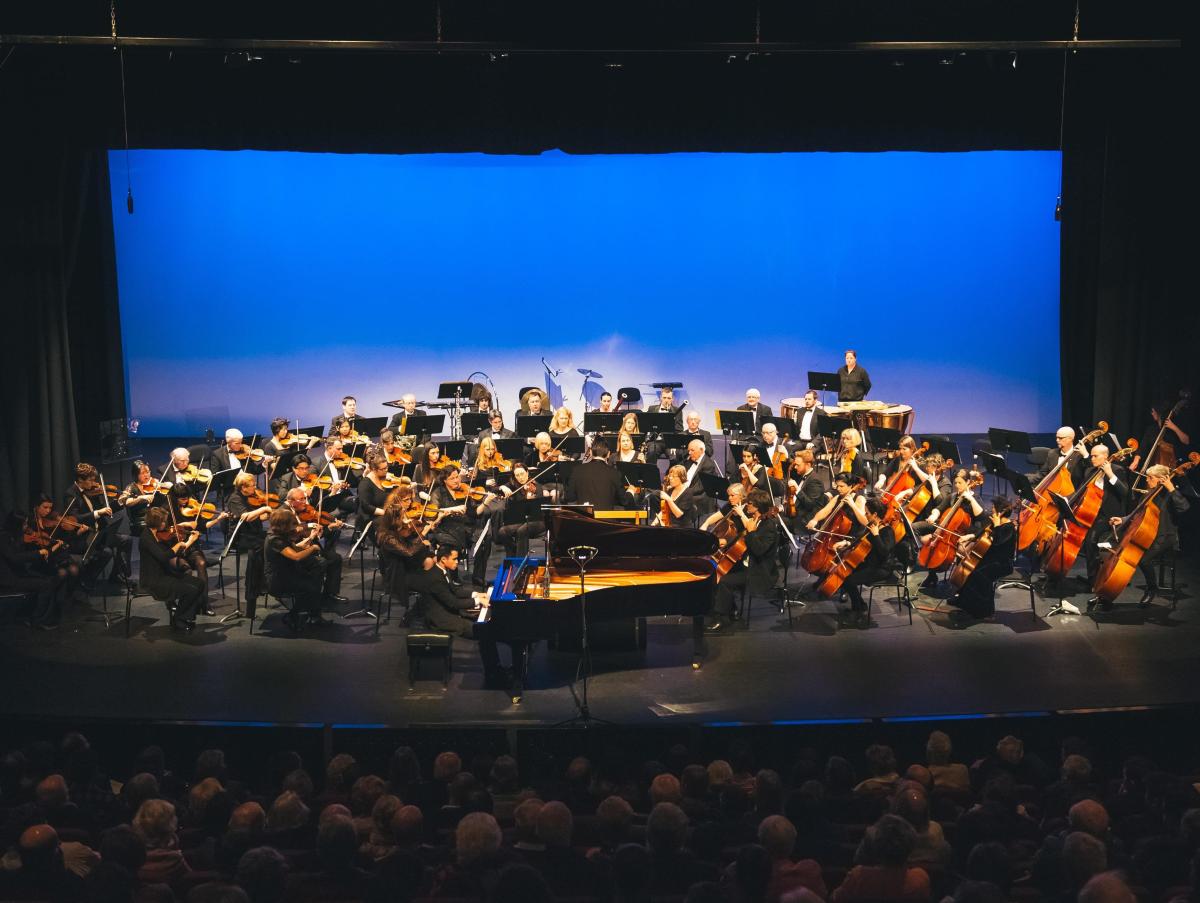Image by Yassar Hameed at Candela Photography
First impressions can be lasting but for the Zelman Orchestra it was the final notes of the works performed that set the tone of the Saturday evening concert at Eldon Hogan Performing Arts Centre. The 67-member orchestra shared, devoured and relished respectively, the premier of Barkrnčev’s contemporary work, Beethoven’s heroic Piano Concerto no. 5 and Tchaikovsky’s alluring Pathétique – all inspirational dialogues on human endeavour, love, loss and jubilation.
Comprised of a proud collection of dedicated educators, emerging youths or retiring/semi-professionals seemingly honoured the folk traditions of Europe, the Zelman Orchestra produces music from the people and for the people and provides a diary of collective soul which crosses life spans. With confident lead players, sensitive woodwind, dedicated double bass and an unpretentious (baggy pants) conductor, these players – who provided a platform for the young musicians of the night – were happy to have their instrument in their hands and not in its case on the family living-room shelf. However, with that said, the three works performed to an endearing full house could not have been played more differently.
Emerging, craft-focused composer, Bakrnčev, provided a meditation on the life of Pythagoras. The four-movement work (more discernibly two) had an atmospheric quality with a lush central pivot point. Although thoughtfully notated the tepid timpani, indulgent col legno and ‘off the back foot’ trumpet and trombones meant that attack and commitment through phrases was lacking. In this case, where contemporary tension-building strategies were employed, there was not enough gristle to drive this piece to climatic points and reveal the composers perceived intent.
The robust, dashing confidence of piano soloist Hoang Pham transferred well to the warhorse ‘Emperor’ in Beethoven’s patriotic and imaginative final Piano Concerto. But the soloist’s compatriot, the orchestra, was sheltered in the march-like movements and heroic quality. In spite of Beethoven’s impaired hearing at the time, the artillery thunder as Napoleon’s troupes descended on Vienna would have been disturbing. Pham’s delicacy and technique were well developed, particularly the second theme and second movement, but long notes and ends of phrases lacked earth into the piano board. Pham aimed to please, but this was the problem – Beethoven never did. Pham’s Chopin encore allowed the colours of his playing to come to the fore and showed the innate hunger of this performer. With one eye on the crowd and a twinkle in his eye, Pham is one to watch as he continues to add life to important works from our western world’s heritage and hopefully finds who he is along the way.
The emotionally laden Tchaikovsky’s Pathetique was the hope jewel of the evening. The eruption leading into the fugue during the first movement, relished by the tuba, added fire to the mysterious contemplation on life and love, a piece conducted by Tchaikovsky nine days before his death. The endless drills of these musicians in their youthful practice provided dexterity for some, notably violins, to cope with the scalic nature of the piece. The woodwind soloists gave an earnest warmth to Tchaikovsky’s melodies and the sometimes murky notes forgiven for a whole-hearted rendition where phrases blossomed and soared (as predicted, applause came after the third movement) and the palate of drama, grace, wistfulness, dance, brilliance and the concluding heartfelt dirge from the players was expressed from their sensitive hearts to hands.
Both unlucky in love, and composers who took the palate of emotions to extreme, Beethoven and Tchaikovsky (hopefully not Barknčev who is known to cry when he steps on a snail), are about authenticity. If the quality of the performance was based on pathos then the Zelman Orchestra delivered in spades. And the silence that rang out after the final note was much appreciated. Why we take the music instantly from the air by clapping, one will never know.
Rating: 3 ½ out of 5 stars
Zelman Symphony: Emperor
Eldon Hogan Performing Arts Centre, Xavier College
www.zelmansymphony.org.au
20 September





